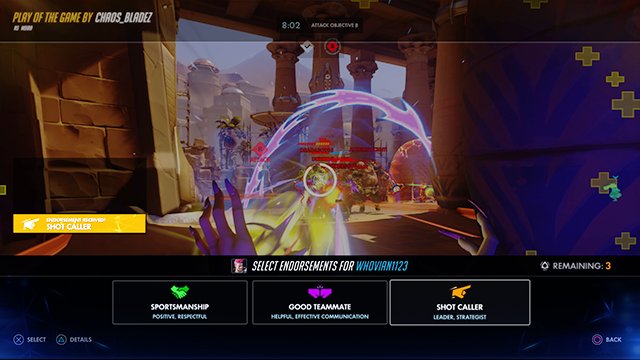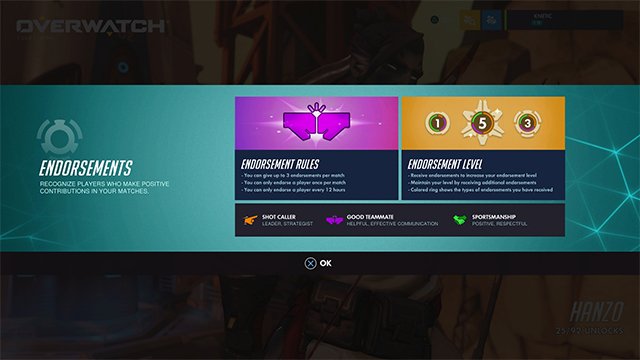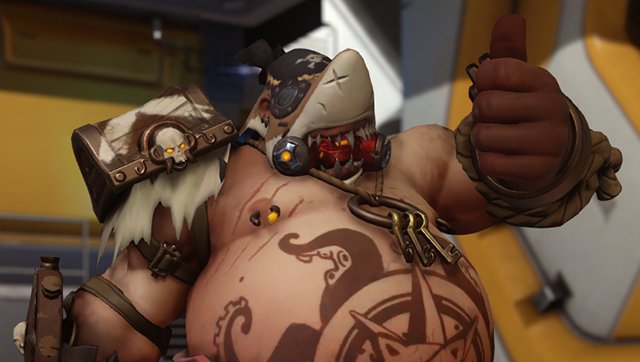Despite its colorful, cheerful cast of characters, Overwatch, like all online games, has a toxicity problem. Over 40 million players are bound to bring some sort of ruckus, and not the good Wu-Tang kind. To combat this, Blizzard recently introduced the Endorsements system into the game, which allows people to grant kudos to valuable players during a match. Earn enough kudos and you’ll be rewarded with loot boxes or skin discounts. People have accused the system of encouraging fake manners to farm experience points, but its genuineness is irrelevant. The Endorsement system not only fits more in line with the game’s tone, but is also carving a path for players to learn better behavior.
Everything in Overwatch is built upon positivity and inclusivity. The stylized visuals are inviting. The diverse, constantly growing cast shows that there is a place for everyone to succeed. Kills are divided amongst the appropriate teammates and let everyone feel important. And the orchestral score on the main menu immediately greets you with a musical version of the same positivity found in a motivational speech by Terry Crews. But that optimism is rarely found in the actual game, given the online nature of it.
I muted the team chat because I was tired of screaming randos. I blocked off my entire profile because a troll kept repeatedly telling me to kill myself. I can’t send most positive messages to my teammates on PSN because a good portion of them have similarly private inboxes. All the clever ways that Blizzard designed around positivity were being hampered by the natural negativity that powers online gaming as a whole. They stepped up how players could report one another and avoid certain toxic folks, but those negative feedback loops didn’t feel like the right solutions.
Endorsements are the positive feedback loops that the game needed. The amount of post-game high fives and metaphorical slap-ass that happens when people are endorsing each other fosters a sense of camaraderie that’s safe from verbal abuse and appropriately video gamey. It’s gamified decency with all the proper game design bells and whistles like a separate leveling system, sound effects, and experience points that tickle your brain and make you feel good for giving and receiving endorsements.
Overwatch Endorsements: Sincerity Rarity

But like any gamified online system, it can be exploited and stripped of its wholesome intent, which is what some pessimistic community members are already decrying. It’s a legitimate argument on its face but fails to recognize one key thing: being “fake nice” is just being nice. Stripped of voice chat, words, and tone, a pat on the back is only a pat on the back with no concrete ulterior motives. PC players have more grounds to complain about fake manners since, unlike consoles, they can directly communicate with the other team and type messages during the game, but the point still stands.
Aside from fake praise being better than real salt, it has the budding potential to last and make the community a better place in the long run by incentivizing and rewarding kindness. According to a 2010 study, online positivity is more contagious than online negativity. The paper compiled 46,000 messages on Twitter about the Winter Olympics and determined that positive messages were three times more likely to spread than negative ones. Although we’ve seen that happiness was also found to spread between people in real life, that online happiness infection is what Blizzard must be trying to emulate.
Overwatch Endorsements: Endorsement Enforcement

It makes sense when considering how game designers are already used to manipulating our emotions and creating systems to encourage certain behaviors. Celebratory musical cues, delayed gratification, slowly growing XP bars, and more are all ways developers condition players and keep them invested. It’s why leveling up in Call of Duty is usually accompanied by a sweet sound effect and why there’s a delay between getting and opening an Engram in Destiny. Blizzard is especially guilty of this, given the erotic nature of opening loot boxes in Overwatch and the entire existence of World of Warcraft. Game designers aim to predict and influence our feelings and emotions all time but it’s rarely used for making the game a more positive place.
However, there is a Skinner box hidden just beneath the surface. As psychologist B.F. Skinner found out with his pigeons, people love getting rewards at random intervals during an activity. Blizzard has stated that people will be getting rewards for keeping up their Endorsement rating, but they didn’t say when. Game director Jeff Kaplan stated that they’ll have “check-in moments” at irregular intervals and give players who maintain a high Endorsement level a skin discount or loot box. Like those feathered rats pecking at a button, yielding vague gifts at a random time is a form of operant conditioning that nudges players towards being better people online, even if they claim the rewards aren’t a main reason they’re doing it. But, as opposed to other gaming Skinner boxes, this isn’t constructed with nefarious intent.
And if Blizzard wants to use their game design mastery to lightly manipulate players into creating a better environment for themselves, then everyone should not only accept the Overwatch Endorsements, but be thrilled to have it. It matches the game’s optimistic tone and paves the way for players to act nicer even if they don’t always mean it. Online games have typically had the outward image of fostering cesspits of toxic behavior and shutting people out. When put in that perspective, it makes sense that an inclusive game like Overwatch would take a noteworthy step in the right direction.







